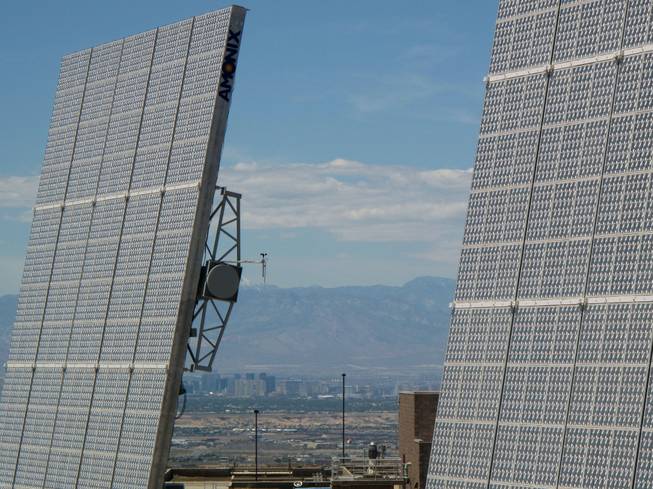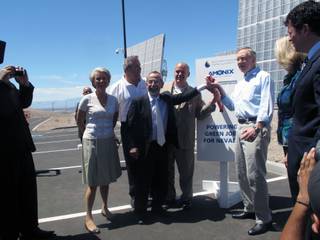
The Las Vegas Valley is seen between two solar panels at the Southern Nevada Water Authority’s River Mountains Water Treatment Facility in Henderson.
Tuesday, May 18, 2010 | 7:46 p.m.
Sun archives
- New solar manufacturing plant to create 300 jobs (5-15-2010)
- Energy chief stuns environmentalists with renewable energy approach (5-11-2010)
- Solar manufacturer First Solar buying developer NextLight Renewable Power (4-28-2010)
- Planned wind-turbine plant gathers gust of momentum (4-28-2010)
- Plant to bring green-job windfall (3-12-2010)
- Companies announce plans for wind turbine manufacturing plant (3-11-2010)
The Nevada Commission on Economic Development has approved a $1.3 million tax abatement incentive package to a California company that is building a solar panel manufacturing plant in Southern Nevada.
Seal Beach, Calif.-based Amonix Inc., which last weekend showed off a solar power generating plant it built for the Southern Nevada Water Authority, won unanimous approval for sales tax and modified business tax abatements at Tuesday’s commission meeting.
The commission’s economic analysis of the abatement plan shows that the new plant would generate $1.9 million a year in new tax revenue once the plant is in operation. The estimate is based on sales taxes, business taxes and personal and business property taxes that would be generated when the estimated 269 jobs are created.
Amonix qualified for a state abatement and tax deferral package by creating 259 percent more jobs than required by statute and 1,720 percent more than required in capital investment when it spends $18.2 million to build the new plant.
The company didn’t meet the wage criteria with the plant expected to offer an average wage of $17.55 an hour. The state minimum by statute is $20.03 an hour.
Companies that seek tax abatement and deferral incentives in the state must meet two of the three criteria.
The company is also getting a 60-month deferral in paying $364,095 in state sales tax as well as a $5.9 million tax credit as from the federal government through the American Reinvestment and Recovery Act. The package approved by the commission also enables the company to apply for $305,000 in state training grants.
Amonix CEO Brian Robertson said the company still hasn’t identified a site for the plant but has narrowed the search to three possible locations. He didn’t disclose the locations, but said once the site is selected, construction would begin immediately and the plant would be operational by the end of the year.
The company will run two or three shifts and produce 77-by-55-foot high-concentrated photovoltaic solar panels for projects in Nevada, Arizona, Utah, Colorado and Southern California.
The Amonix technology uses lenses to magnify the sun’s rays to convert to power and the panels track the sun’s position in the sky for maximum efficiency. Unlike many solar power systems, the Amonix system doesn’t need water in the process.
Somer Hollingsworth, president and CEO of the Nevada Development Authority, which assisted Amonix through the incentive application process, said he was enthused that the company has indicated it would work to get suppliers for the plant to operate in Southern Nevada.
“This is the kind of company we’ve needed here, and they’re going to try to get others to come as well,” he said.
Amonix also worked closely with UNLV during the installation of the Water Authority’s power plant.
In other business, the commission unanimously approved tax abatements and deferrals for the expansion of Roberts Communications Network LLC in Clark County.
The $1.1 million abatement and deferral package will enable the company to expand in Nevada by moving some of its New Hampshire operations here.
Roberts, a 25-year-old privately held company with 83 employees, provides the telecommunications network that feeds horseracing broadcasts to Las Vegas casinos.
Todd Roberts, president and CEO of the company, told commissioners he plans to expand broadcasts to new clients and also has expanded the network to provide distance education programs, which transmit classroom content by satellite to remote locations.
The company hasn’t determined where it would build its new facility but is considering sites in unincorporated Clark County and Henderson.


Join the Discussion:
Check this out for a full explanation of our conversion to the LiveFyre commenting system and instructions on how to sign up for an account.
Full comments policy